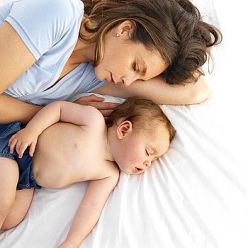Are you familiar with this recent news story in which a Texas mother was found guilty for the death of her two-month-old son? The baby died in the night while co-sleeping with her and her husband. Not only is the story tragic, but it’s also bizarre and unthinkable. This same couple lost an infant son just one year prior as a result of a similar co-sleeping situation.
When it comes to the topic of co-sleeping, I have no first-hand knowledge. But it’s a topic that has always intrigued me. I never even knew the concept existed until after I had a baby and met other mothers – and fathers – who co-sleep with their child and swear by it. I’ve also met parents who co-sleep with more than one child (and I’ve often wondered how the second child ever happened!) Then I’ve met moms who wind up in this situation not by choice and either stress about it or accept it. Just about everyone I’ve talked to about co-sleeping is familiar with the dangers of co-sleeping, yet many choose this way of life anyway.
Today I thought we’d tackle the pros and cons on this subject and let moms chime in with their thoughts, opinions and personal experiences.
Are you a co-sleeper despite the dangers? If so, why? Perhaps there is someone out there who is struggling with this situation but cannot find a successful way to break the habit. Can someone offer advice on how to transition a baby from your bed to the crib or bassinet?
To start, here are some Pros and Cons on this subject that I discovered from online research: :
Pros
– Some studies have shown that sleep-sharing babies tend to breastfeed more, yet disrupt their mother’s sleep less, than babies who sleep alone. Mothers who share a bed with their baby tend to breastfeed their babies for longer periods of time, perhaps because they find it easier to breastfeed in bed rather than getting up during the night to feed their baby. (That makes sense to me because I did breastfeed both of my children and it’s a lot easier to just pull them into bed for feedings rather than get up and sit with a Boppy pillow!)
– If you and your partner both work during the day, co-sleeping can give you some extra time to spend with your baby. The nurturing and closeness that happen during the night can help create a stronger relationship between you and your child.
-Some people believe that babies who co-sleep with their parents are more independent, more outgoing, and more confident as children. As adults, they have higher self-esteem, better stress-management skills, and are more comfortable with intimacy than adults who slept alone as babies. However sleeping arrangements on their own cannot make your baby into a particular type of person.
– Some studies have also suggested that on average, babies who co-sleep wake less often, and go back to sleep sooner, than babies who sleep alone in another room. However, some babies simply are better able to soothe themselves back to sleep than others. For this reason, it’s misleading to think that co-sleeping will influence when your baby starts sleeping through the night.
– Babies who sleep with their parents tend to stay awake for shorter periods of time during the night than solitary sleepers, and they may cry significantly less, too. Sleeping close to your baby allows you to quickly respond if she starts to cough or cry in the night.
Cons
– The U.S. Consumer Product Safety Commission and the American Academy of Pediatrics (AAP) believe the risks of co-sleeping outweigh the benefits. Co-sleeping, they say, puts babies at risk of suffocation and strangulation, and hidden hazards with adult beds. Additionally, the AAP reports that, under certain conditions, co-sleeping may increase the risk of sudden infant death syndrome (SIDS), especially if one or both parents smoke.
– Sharing your bed with a wriggling, kicking, squirming baby takes some getting used to, and you may not sleep as well as you do when your baby sleeps alone. If your baby gets used to falling asleep next to you, she may have trouble sleeping when you leave her with a relative or babysitter. Depending on how old your child is and how long she has been sleeping with you, making the eventual transition from family bed to her own bed can be a long and drawn-out process.
– Sleep sharing can affect your love life too. Spontaneous lovemaking when your baby’s in the bed tends isn’t really an option; many parents find another room to make love in to avoid disturbing their baby. At times, one or both of you may resent having to make this kind of compromise.
Call me crazy, but while there seem to be more pros than cons, the cons listed above are pretty much a deal breaker for me. What are your thoughts?
Research cited from www.babycentre.co.uk and www.geoparent.com.
















